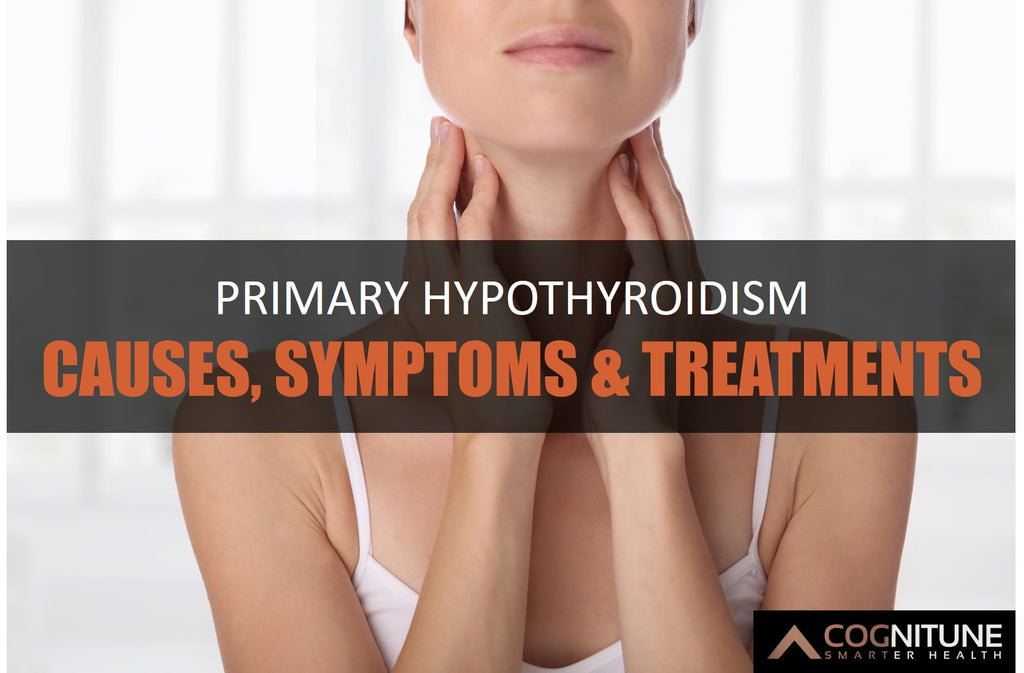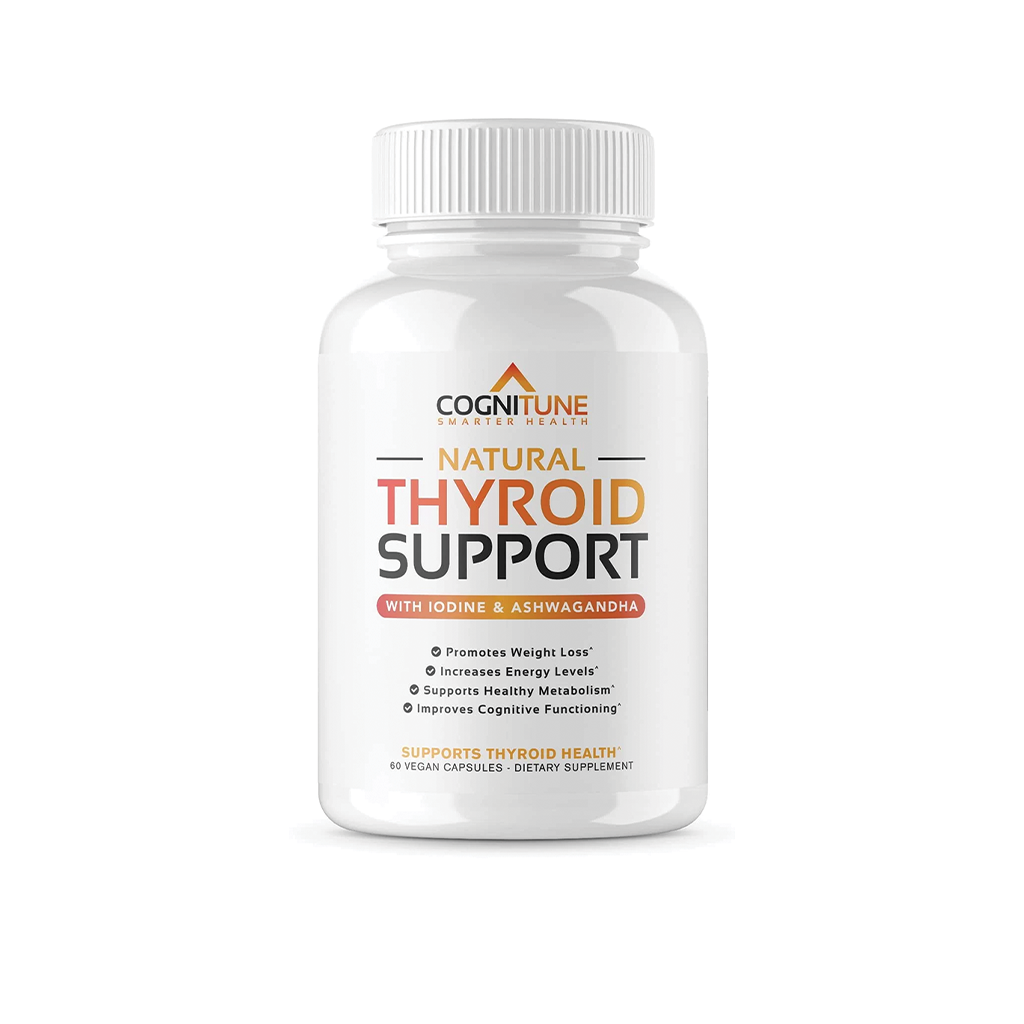Primary Hypothyroidism: Causes, Symptoms, and How to Treat It

Your thyroid is a gland that controls your body’s metabolism. The thyroid is stimulated by a hormone known as thyroid-stimulating hormone (TSH), which is released by your pituitary gland. After it’s been stimulated, your thyroid will release two hormones, T4 and T3 – these are the hormones that control your body’s metabolism.
When you have hypothyroidism or underactive thyroid, you’re dealing with your thyroid not producing enough of the T3 and T4 hormones. Three types of hypothyroidism exist: primary, secondary, and tertiary.
Primary hypothyroidism happens when your thyroid is being properly stimulated, but it can’t create enough hormones for your body to function properly. Ultimately, primary hypothyroidism means that the source of the disease lies with your thyroid.
Secondary hypothyroidism occurs when the pituitary gland doesn’t do a good enough job stimulating your thyroid, which leads to fewer hormones being produced. With secondary hypothyroidism, the problem doesn’t lie with your thyroid. The same is true with tertiary hypothyroidism.
Causes of Primary Hypothyroidism
Hashimoto’s thyroiditis is the common cause of hypothyroidism. Hashimoto’s thyroiditis is an autoimmune disease that makes your immune system attack your thyroid.
There are other reasons why you might have primary hypothyroidism. For example, if you had an overactive thyroid or hyperthyroidism, the treatment for it could have left you with primary hypothyroidism.
Hyperthyroidism treatments include radioactive iodine, which damages the thyroid. Another treatment is the surgical removal of all or part of your thyroid. Both treatments can lead to your development of primary hypothyroidism.
If you had thyroid cancer, chances are your doctor removed all or part of your thyroid to treat thyroid cancer.
The other possible causes of primary hypothyroidism include:
- Viral thyroiditis
- Certain drugs
- Congenital disease
- Insufficient iodine in your diet
There are even some cases where a woman develops primary hypothyroidism after giving birth. The National Institute of Health states that the disease is most common in people over 60 and women.
Primary Hypothyroidism Symptoms
The symptoms that you experience if you have primary hypothyroidism will vary from person to person. The symptoms tend to develop at a slow rate and will depend on how severe the disease is.
At first, you might notice general symptoms that include:
- Muscle weakness
- Depression
- A new sensitivity to the cold
- Lethargy
- Fatigue
You might also notice that you gain weight because your thyroid hormones control your body’s metabolism.
Other symptoms include:
- Puffiness of the face
- Voice hoarseness
- Brittle nails or hair
- Constipation
- Pain in your muscles or joints
As the primary hypothyroidism disease progresses, the symptoms that you experience will gradually become more severe. If your primary hypothyroidism is extremely severe, you can fall into a coma known as myxedema coma – this is life-threatening.
How Primary Hypothyroidism is Diagnosed
If you start showing physical symptoms that are found with primary hypothyroidism, you should go to the doctor. Your doctor could decide that some tests are needed to see if you have primary hypothyroidism or not.
Generally, blood work tests are done to test your TSH and T4 levels. If they find that your body has an increased amount of TSH, then there’s a high possibility that you have primary hypothyroidism. This is because your pituitary gland will produce more TSH as an attempt to make your thyroid produce more T4 and T3.
How Primary Hypothyroidism is Treated
The treatment for primary hypothyroidism consists of medication that’s used to replace the missing hormones that your thyroid gland is failing to produce. Generally, your doctor starts you on a low dosage and gradually increases it. The main goal of this treatment plan is to get your thyroid hormone levels to get into the normal range.
The downside to this treatment is that you’ll be on medication for the rest of your life. This is because the medicine is made to replace the hormones that aren’t being created by your thyroid, not cure primary hypothyroidism.
There are some supplements and medicines that interfere with thyroid disease medication. So, you need to make sure that you’re informing your doctor of all medicines and supplements that you’re taking, including those found over the counter.
Natural Treatments for Primary Hypothyroidism
There are several natural treatments for primary hypothyroidism that you can also try out. These include:
Taking on a Gluten-Free Lifestyle
Diet is by far the biggest factor in managing your primary hypothyroidism. Many people have seen improvements in their symptoms after they adopt a gluten-free lifestyle.
People who are sensitive to gluten have a higher risk of developing thyroid issues; this could be because gluten causes damage to the lining of your gut, which can interfere with your hormones and cause inflammation that can reach your thyroid.
Limiting Your Intake of Sugar
One of the main jobs of your thyroid gland is to regulate your carbohydrate metabolism. If your body isn’t making enough thyroid hormones, you’ll find that your body tends to struggle to balance your blood sugar, which leads to metabolic issues, weight gain, and fatigue.
So, it’s a great idea to cut back on the amount of sugar in your diet, even if you don’t have a thyroid issue.
Eating Iodine Rich Foods
An essential mineral for the production of thyroid hormones is iodine, and many of us don’t get enough of it in our diets. You can eat iodized salt and take iodine supplements, but the iodine found in food has a more significant impact on your thyroid function.
Some foods that have a good source of iodine include:
- Cheese and yogurt
- Oysters
- Shrimp
- Nori
- Seaweed
Taking Probiotics
The bacteria in your gut play an important part in regulating thyroid hormones in your body. This is because it’s one of the largest reservoirs for thyroid hormones, and the good bacteria in your gut can convert T3 hormones into T4 hormones.
Taking a high-quality probiotic supplement can help balance out the bacteria in your gut and support the conversion of thyroid hormones.
Taking a Natural Supplement
You can take a natural supplement to help alleviate the symptoms of primary hypothyroidism and even help protect your body against it. Our recommended supplement is our Thyroid Support Complex.
It includes vitamin B-12, iodine, magnesium, selenium, and ashwagandha & more, and is designed to help regulate your thyroid and rejuvenate it. All of these ingredients can help make your primary hypothyroidism symptoms less severe.

